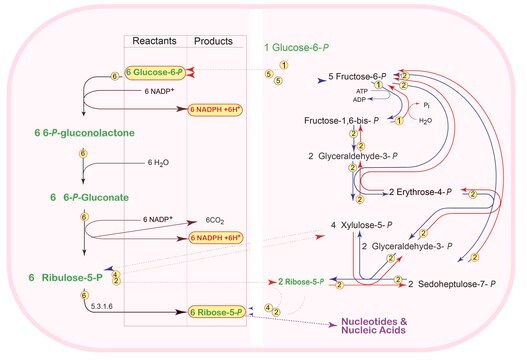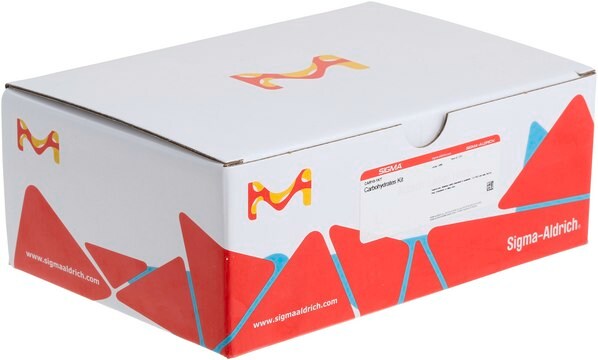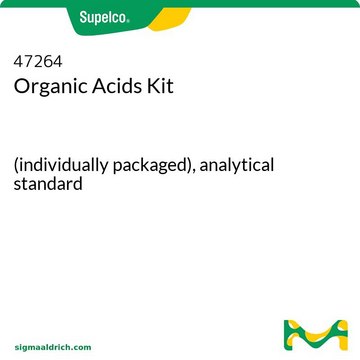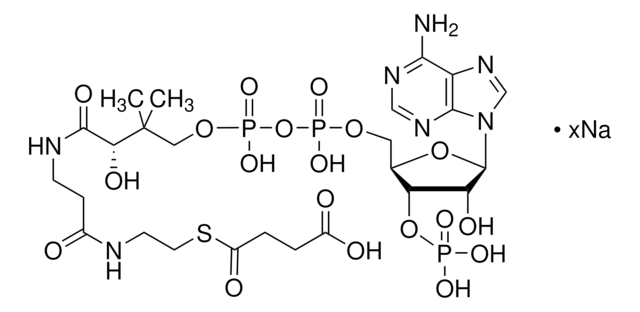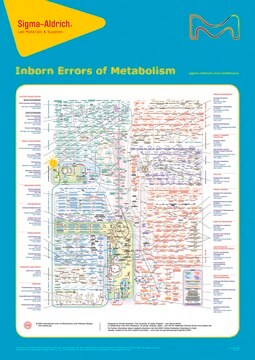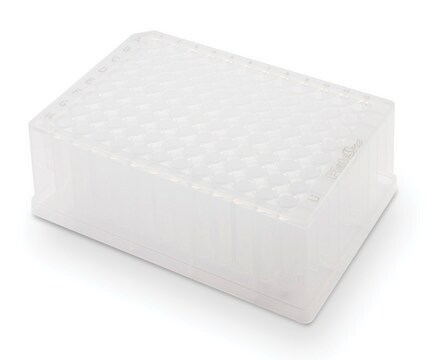ML0010
TCA Cycle Metabolite Library
Synonim(y):
Kreb′s Cycle Metabolite Library
About This Item
Polecane produkty
temp. przechowywania
−20°C
Poziom jakości
Zastosowanie
- Reinforcing the Evidence of Mitochondrial Dysfunction in Long COVID Patients Using a Multiplatform Mass Spectrometry-Based Metabolomics Approach.: This study utilizes an advanced metabolomics approach to understand mitochondrial dysfunction in long COVID patients, highlighting the application of the TCA Cycle Metabolite Library for in-depth biological analysis (Martinez et al., 2024).
- OGDH and Bcl-xL loss causes synthetic lethality in glioblastoma.: This research explores the critical interactions in metabolic pathways, particularly the TCA cycle, affecting glioblastoma′s cellular metabolism and identifying potential therapeutic targets (Nguyen et al., 2024).
- The interactions and biological pathways among metabolomics products of patients with coronary heart disease.: Demonstrates how metabolomics, including TCA cycle metabolites, can reveal complex biochemical pathways in coronary heart disease, offering insights into potential interventions (Chu et al., 2024).
- Reduction in creatine metabolites in macrophages exposed to small molecule analogues of the anti-inflammatory parasitic worm product ES-62.: Investigates the impact of altered TCA cycle metabolites on macrophage biochemistry, providing a foundation for therapeutic research (Alanazi et al., 2024).
- In-vivo tracking of deuterium metabolism in mouse organs using LC-MS/MS.: This study applies cutting-edge analytical techniques to trace metabolic pathways in vivo, including key TCA cycle intermediates, which could be pivotal for clinical metabolic research (Kasarla et al., 2024).
Komponenty
Uwaga dotycząca przygotowania
Elementy zestawu są też dostępne oddzielnie
- A2056Acetyl coenzyme A trisodium salt, ≥93% (HPLC), powder 10 mgKarta charakterystyki
- C7129Citric acid monohydrate, reagent grade, ≥98% (GC/titration) 10 mgKarta charakterystyki
- F1506Sodium fumarate dibasic, ≥99% 10 mgKarta charakterystyki
- M1000L-(−)-Malic acid, ≥95% (titration) 10 mgKarta charakterystyki
- O4126Oxaloacetic acid, ≥97% (HPLC) 10 mgKarta charakterystyki
- P2256Sodium pyruvate, ReagentPlus®, ≥99% 10 mgKarta charakterystyki
- S1129Succinyl coenzyme A sodium salt, ≥85% 10 mgKarta charakterystyki
Hasło ostrzegawcze
Warning
Zwroty wskazujące rodzaj zagrożenia
Zwroty wskazujące środki ostrożności
Klasyfikacja zagrożeń
Eye Irrit. 2 - Skin Irrit. 2 - Skin Sens. 1 - STOT SE 3
Organy docelowe
Respiratory system
Kod klasy składowania
10 - Combustible liquids
Temperatura zapłonu (°F)
Not applicable
Temperatura zapłonu (°C)
Not applicable
Certyfikaty analizy (CoA)
Poszukaj Certyfikaty analizy (CoA), wpisując numer partii/serii produktów. Numery serii i partii można znaleźć na etykiecie produktu po słowach „seria” lub „partia”.
Masz już ten produkt?
Dokumenty związane z niedawno zakupionymi produktami zostały zamieszczone w Bibliotece dokumentów.
Klienci oglądali również te produkty
Produkty
Information on fatty acid synthesis and metabolism in cancer cells. Learn how proliferatively active cells require fatty acids for functions such as membrane generation, protein modification, and bioenergetic requirements. These fatty acids are derived either from dietary sources or are synthesized by the cell.
Nasz zespół naukowców ma doświadczenie we wszystkich obszarach badań, w tym w naukach przyrodniczych, materiałoznawstwie, syntezie chemicznej, chromatografii, analityce i wielu innych dziedzinach.
Skontaktuj się z zespołem ds. pomocy technicznej
